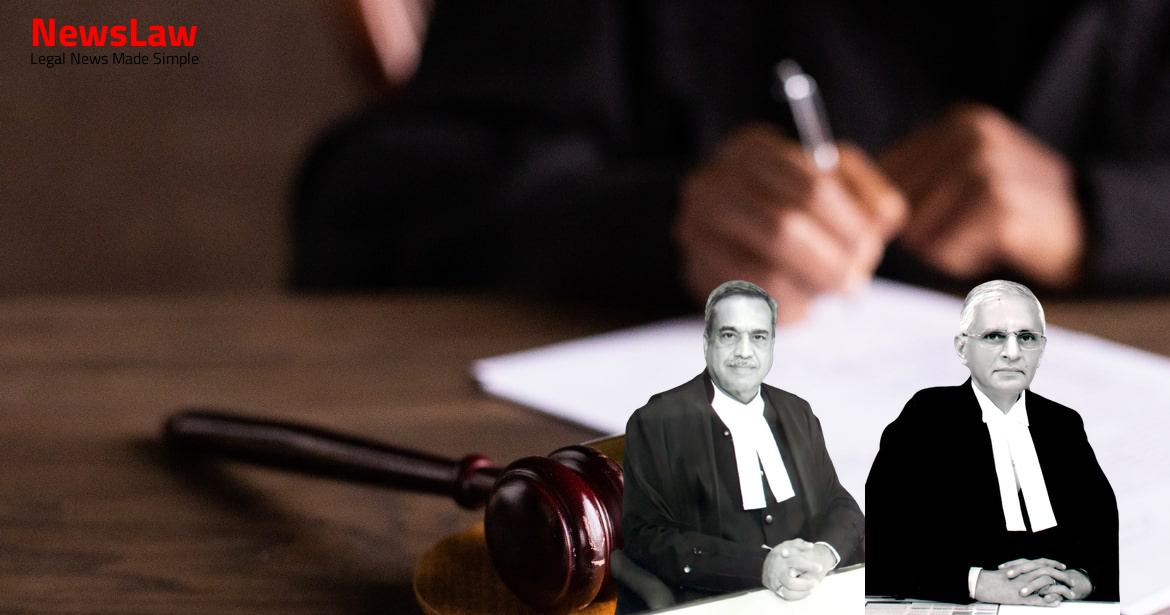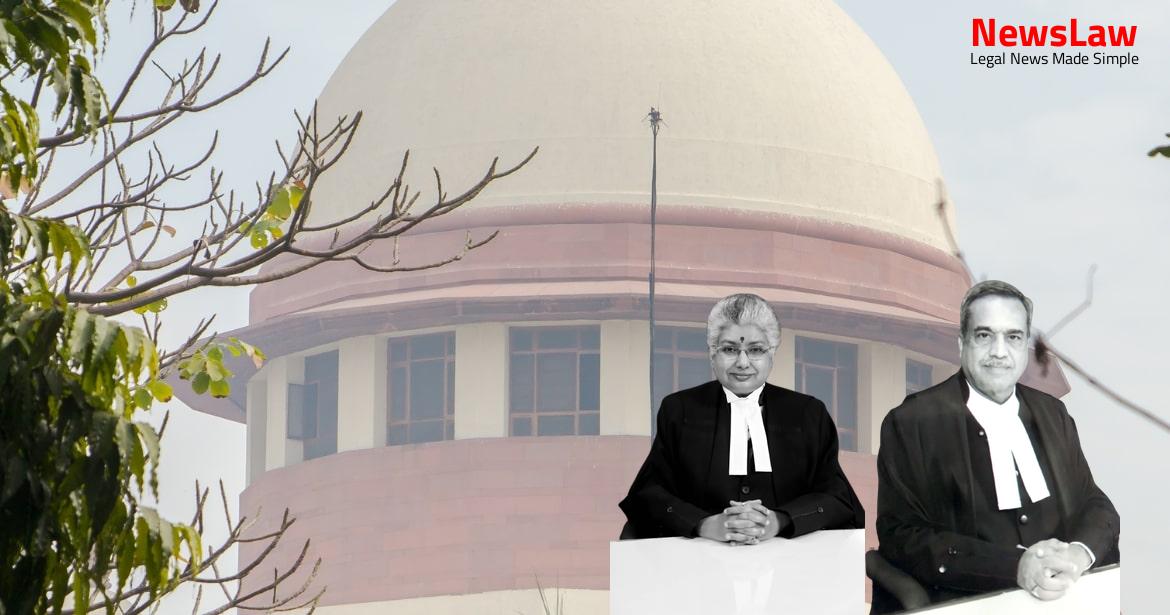The trial court sentenced the petitioner and three other co-accused persons to undergo rigorous imprisonment for life; while three other accused were acquitted on all charges. The petitioner’s conviction and sentence (along with that of three other co-accused convicts), was affirmed by the High Court on 01.09.2005. After the completion of the mandatory 14 years actual imprisonment, and 20 years of custody with remission, the petitioner’s case (application dated 14.04.2021) was considered by the Remission Board on 19.05.2021. d) Convicted prisoners, who commit murder while involving in smuggling operations or who are guilty of murder of public servants on duty” (emphasis supplied) 6. Power to suspend or remit sentences.—(1)
Also Read: https://newslaw.in/supreme-court/legal-analysis-of-claim-for-loss-of-profit-in-delayed-contract/
*** (2) Whenever an application is made to the appropriate Government for the suspension or remission of a sentence, the appropriate Government may require the Presiding Judge of the Court before or by which the conviction was had or confirmed, to state his opinion as to whether the application should be granted or refused, together with his reasons for such opinion and also to forward with the statement of such opinion a certified copy of the record of the trial or of such record thereof as exists.” 8.
This statutory power to grant remission is limited by Section 433A (which was incorporated in the CrPC subsequently ) when it comes to those convicted for an offence where death is one of the punishments: “ 433-A. Nevertheless we may point out that the power of the sovereign to grant remission is within its exclusive domain and it is for this reason that our Constitution makers went on to incorporate the provisions of Article 72 and Article 161 of the Constitution of India.
Power of clemency is to be exercised cautiously and in appropriate cases, which in effect, mitigates the sentence of punishment awarded and which does not, in any way, wipe out the conviction. […] Therefore, when in the course of exercise of larger constitutional powers of similar kind under Articles 72 and 161 of the Constitution it has been opined by this Court to be exercised with great care and caution, the one exercisable under a statute, namely, under Section 432(1)CrPC which is lesser in degree should necessarily be held to be exercisable in tune with the adjunct provision contained in the same section. It must also be borne in mind that while for the exercise of the constitutional power under Articles 72 and 161, the Executive Head will have the benefit of act and advice of the Council of Ministers, for the exercise of power under Section 432(1)CrPC, the appropriate Government will get the valuable opinion of the judicial forum, which will definitely throw much light on the issue relating to grant of suspension or remission.” The court then proceeded to approve the following reasoning in Sangeet v.
Sub-section (1) of Section 432CrPC cannot be read to enable the appropriate Government to “further override” the judicial pronouncement over and above what is permitted by the Jail Manual or the statutory rules. At the time of considering the case of premature release of a life convict, the authorities may require to consider his case mainly taking into consideration whether the offence was an individual act of crime without affecting the society at large; whether there was any chance of future recurrence of committing a crime; whether the convict had lost his potentiality in committing the crime; whether there was any fruitful purpose of confining the convict any more; the socio-economic condition of the convict’s family and other similar circumstances.” (emphasis supplied)
This was based on an earlier judgment (though not expressly cited in Jagdish ) – Laxman Naskar v. Sriharan, (2016) 7 SCC 1 : (2016) 2 SCC (Cri) 695], the Court observed that the opinion of the Presiding Judge shines a light on the nature of the crime that has been 8 committed, the record of the convict, their background and other relevant factors. Union of India, (2000) 2 SCC 595 : 2000 SCC (Cri) 509], the Government may request the Presiding Judge to consider the matter afresh. State of W.B., (2000) 7 SCC 626: 2000 SCC (Cri) 1431] and State of Haryana v.
It may satisfy the requirement of giving reasons if relevant reasons have been given for the order, though the authority has not set out all the reasons or some of the reasons which had been argued before the court have not been expressly considered by the authority. Further, it will not serve the purpose for which the exercise under Section 432(2) is to be undertaken, which is to enable the executive to make an informed decision taking into consideration all the relevant factors.” 13. A brief glance at all the reports submitted by the authorities to the Remission Board before each of its two meetings where it considered the petitioner’s case, is telling: 10 Considered in Remission Board meeting dated 19.05.2021 Considered in Remission Board meeting dated 20.04.2023 Jail Superintendent report dated 27.04.2021: “conduct of prisoner is satisfactory. ” Police Superintendent’s report dated 11.01.2021: “…DPO has reported that on release of prisoner, there does not seem to be any possibility of any law-and-order problem will arise” Police Superintendent’s report dated 22.07.2022: Noting the input received from the concerned DPO – “…The local people have got the information regarding his premature release. Therefore prayer for remission and commutation of sentence in favor of Rajo@Rajua@Rajendra Mandal may be refused.” 11
Considering the manner of occurrence and seriousness of the case, in my opinion the application remission and commutation of sentence filed on behalf of the convict petitioner should be refused.” Screening Committee/ Inspector General: Took note of the adverse reports of Police Superintendent and Presiding Judge and noted that “2. In that light, the proposal for untimely release from prison can be rejected.” Taking note of the reports before it at the time, the Remission Board concluded as follows: Remission Board meeting dated 19.05.2021 Remission Board meeting dated 20.04.2023 “Favourable report by Probation Officer/ Superintendent of Police, but adverse report by Presiding Judge” Taking note of the adverse reports by the Police Superintendent, Presiding Judge, and conclusion of the Screening Committee/Inspector General regarding clause (iv)(b) – “3.
In this court’s considered view, overemphasis on the presiding judge’s opinion and complete disregard of comments of other authorities, while arriving at its conclusion, would render the appropriate government’s decision on a remission application, unsustainable. All this is not to say that the presiding judge’s view is only one of the factors that has no real weight; but instead that if the presiding judge’s report is only reflective of the facts and circumstances that led to the conclusion of the convict’s guilt, and is merely a reiteration of those circumstances available to the judge at the time of sentencing (some 14 or more years earlier, as the case may be), then the appropriate government should attach weight to this finding, accordingly.
The views of the presiding judge, are based on the record, which exists, containing all facts resulting in conviction, including the nature of the crime, its 13 seriousness, the accused’s role, and the material available at that stage regarding their antecedents. It has been repeatedly emphasized that the aim, and ultimate goal of imprisonment, even in the most serious crime, is reformative, after the offender 14 undergoes a sufficiently long spell of punishment through imprisonment. 433-A in this case–rudely refuses to consider the subsequent conduct of the prisoner and forces all convicts, good, bad and indifferent, to serve a fixed and arbitrary minimum it is an angry flat untouched by the proven criteria of reform.” 20. ), the appropriate government should while considering the potential of the convict to commit crimes in the future, whether there remains any fruitful purpose of continued incarceration, and the socio-economic conditions, review: the convict’s age, state of heath, familial relationships and possibility of reintegration, extent of earned remission, and the post-conviction conduct including, but not limited to – whether 15 the convict has attained any educational qualification whilst in custody, volunteer services offered, job/work done, jail conduct, whether they were engaged in any socially aimed or productive activity, and the overall development as a human being. If a stereotypical approach in denying the benefit of remission, which ultimately results in premature release, is repeatedly adopted, the entire idea of limiting incarceration for long periods (sometimes spanning a third or more of a convict’s lifetime and in others, result in an indefinite sentence), would be defeated. […]
Any order putting the punishment beyond remission will prohibit exercise of statutory power designed to achieve same purpose Under Section 432/433 Code of Criminal Procedure In our view Courts cannot and ought not deny to a prisoner the benefit to be considered for remission of sentence.
This court, on earlier occasion, had grappled with the situation of different remission policies/rules prevailing at different points of the convict’s sentence – i.e., when the policy on the date of conviction, and on the date of consideration for premature release, are different. In case a liberal policy prevails on the date of consideration of the case of a “lifer” for premature release, he should be given benefit thereof.” 24.
Upon conviction, if any person has been sentenced to imprisonment for life for an offense for which one of the punishments is death or if the death sentence has been commuted to life imprisonment under Section 433 of the Code of Criminal Procedure, 1973, and where such sentence of imprisonment for life has been awarded on or after 18.12.1978, such prisoner shall be released from prison only if- a. In light of these findings and the precedents discussed above, it would be appropriate if the Remission Board reconsidered the petitioner’s application for remission afresh, considering the reports of the police and other authorities, the post-prison record of the petitioner, the remissions earned (including that which is earned for good conduct) his age, health condition, family circumstances, and his potential for social engagement, in a positive manner.
Case Title: RAJO @ RAJWA @ RAJENDRA MANDAL Vs. THE STATE OF BIHAR
Case Number: W.P.(Crl.) No.-000252 / 2023



